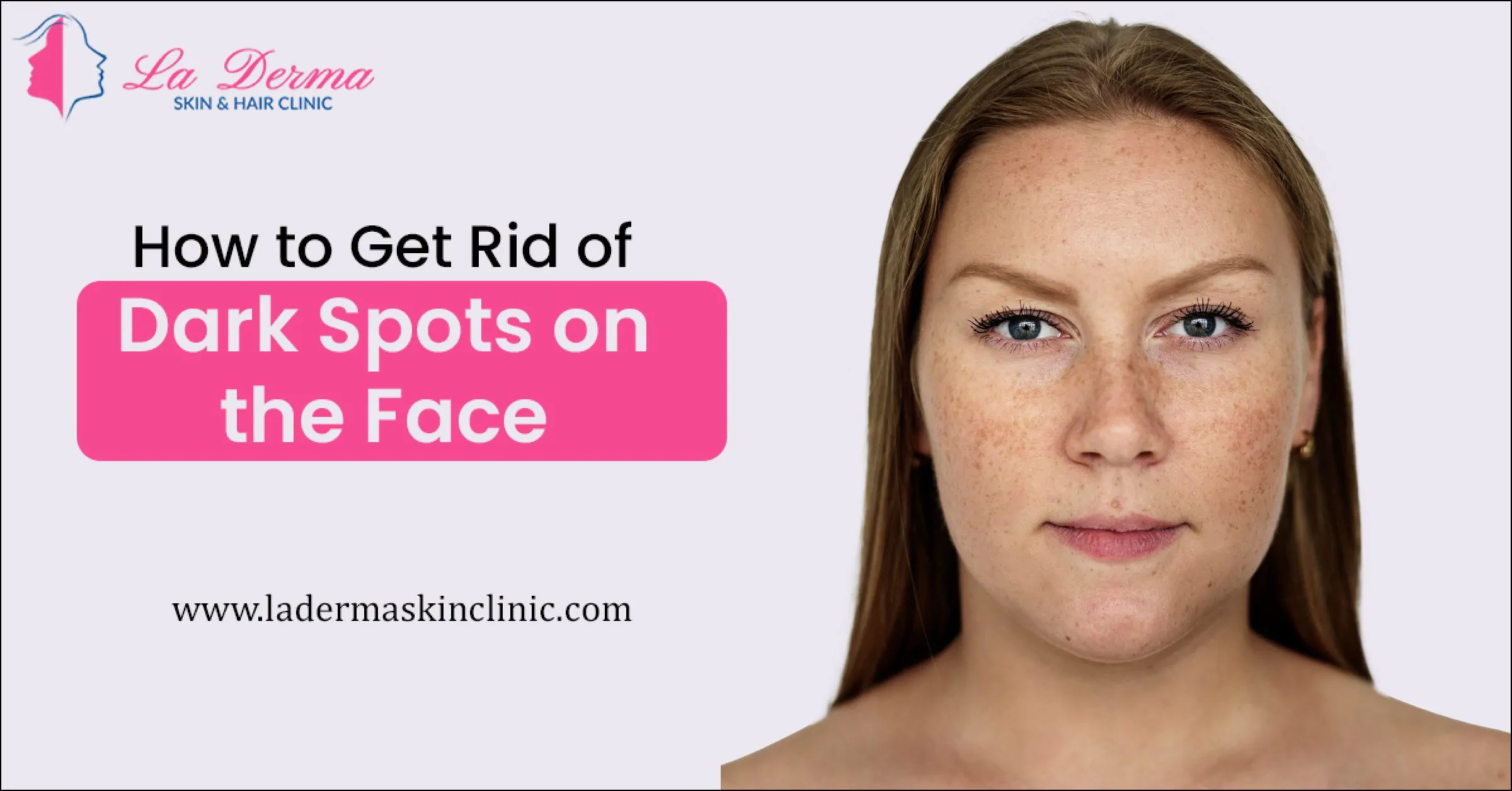
How to Get Rid of Dark Spots on the Face
Dark spots on the face, also known as hyperpigmentation, are skin conditions that affect people of any age and skin type. These spots range from tiny freckles to large patches and are caused by many factors, including sun exposure, hormonal changes, acne scars, and ageing. Knowing how to prevent and treat dark spots can go a long way in promoting healthy skin and beauty.
For expert advice and personalized treatment options, consider consulting the best dermatologist in Kolkata at Laderma Skin Clinic, a leading skin and hair clinic in Kolkata.
Causes of Dark Spots on the Face
- Sun Exposure
The leading cause of dark spots is prolonged exposure to the sun. Exposure of the skin to UV rays causes it to produce melanin because of its damaging effects. The overproduction of melanin causes sunspots, mostly found on the face, neck, and hands.
Prevention Tips:
- Apply sunscreen daily with at least SPF 30.
- Reapply sunscreen every two hours when outdoors.
- Wear protective clothing, hats, and sunglasses.
- Hormonal Changes
Hormonal fluctuations, especially in women, cause a condition called melasma, which is hyperpigmentation. Melasma features brownish patches, commonly on the face. Melanin production is stimulated by pregnancy, birth control, and hormone therapy.
Prevention Tips:
- Use sunscreen daily, as melasma can worsen with sun exposure.
- Discuss any hormone therapies that may affect skin pigmentation with your doctor.
- Post-Inflammatory Hyperpigmentation (PIH)
Dark spots can appear after skin injuries such as acne, cuts, or rashes. When the skin heals, the affected area might develop darker patches, known as post-inflammatory hyperpigmentation.
Prevention Tips:
- Avoid picking or scratching acne and other skin issues.
- Apply a soothing, non-comedogenic moisturizer to help reduce inflammation.
- Aging
As we age, the skin naturally develops “age spots” due to prolonged UV exposure. These are more common in people over 50 but can appear earlier with high sun exposure.
Prevention Tips:
- Maintain a skincare routine that includes SPF and antioxidants.
- Seek professional skin treatments to manage pigmentation effectively.
Effective Treatments for Dark Spots
There are several ways that dark spots can be treated, and the success rate will depend on the individual’s skin type, depth of pigmentation, and the cause of the spots. Some standard treatment methods are:
- Topical Treatments
The topical treatment is, therefore, the most recommended first line of treatment for dark spots. Most commonly, in these over-the-counter and prescription products, the ingredients are vitamin C, niacinamide, retinoids, and hydroquinone.
- Vitamin C: An antioxidant that brightens skin by reducing melanin production.
- Niacinamide: It causes anti-inflammatory effects, reducing the appearance of dark spots.
- Retinoids: These vitamin A derivatives accelerate cell turnover and fade dark spots over time.
- Hydroquinone: Hydroquinone is another potent skin lightener that a dermatologist may prescribe. Use under professional guidance.
However, the use of these products alone has a limited effect.
- Chemical Peels
Chemical peels use acid-based solutions to exfoliate the outer layers of the skin, promoting cell turnover and revealing brighter skin underneath. Glycolic acid and salicylic acid are commonly used to treat dark spots.
How it works:
- Light to medium peels are effective for dark spots.
- It usually requires multiple sessions for optimal results.
- Consult a skin clinic in Kolkata for the right peel type and frequency.
- Q Switch Laser Therapy
Laser treatments using Q -Switched Laser are highly effective for dark spots and pigmentation. These treatments use focused light beams to break down melanin pigment and stimulate new skin growth.
Also Read: How To Get Rid Of Chest Acne?
What to expect:
- Multiple sessions may be needed based on skin type and pigmentation depth.
- Minimal downtime, but mild redness or swelling is normal post-treatment.
For a safe and effective laser treatment, you need to get the treatment from a reputable skin & dermatology clinic in Kolkata like Laderma , who have USFDA Approved Tri-Beam Laser for this treatment and All treatments are done under supervision of a Dermatologist.
- GFC-enhanced PRP Treatment:
– PRP Treatment involves extracting a small amount of blood, concentrating growth factors, and injecting the plasma into the skin with melasma, dark spots, or hyperpigmentation. It is highly effective, with most patients reporting over 80% improvement.
- Derma pen 4 Microneedling:
– This minimally invasive procedure creates microscopic tears in the skin, promoting even skin tone during the healing process. It is performed with the Advanced Derma Pen 4 device at La Derma and is nearly painless.
- Natural Remedies
While professional treatments are more effective, some natural remedies may offer mild improvements:
- Aloe Vera: Contains aloin, which may help reduce pigmentation.
- Green Tea Extract: Rich in antioxidants, which may lighten dark spots.
- Licorice Extract: Known for its skin-brightening properties.
However, consult a dermatologist to determine whether these remedies suit your skin type.
Skincare Routine for Preventing Dark Spots
An effective skincare routine is crucial in preventing and managing dark spots. Here are some tips:
- Cleanse Daily
Cleansing removes impurities and ensures that treatments and moisturizers can penetrate effectively. Choose a gentle, non-drying cleanser.
- Exfoliate Regularly
Exfoliation helps remove dead skin cells, making dark spots look more prominent. Use a mild exfoliator once or twice a week. Avoid harsh scrubbing to prevent irritation.
- Moisturize
A moisturizer keeps the skin hydrated, reducing irritation and inflammation that can worsen dark spots. Look for products containing hyaluronic acid or glycerin.
- Sun Protection
Sun protection is essential to prevent dark spots from worsening. Apply sunscreen daily and wear protective clothing. A dermatologist can recommend the best SPF for your skin type.
- Use Brightening Serums
Serums containing vitamin C, niacinamide, or alpha arbutin can help lighten dark spots over time. Apply these serums before moisturising.
When to See a Dermatologist
While mild dark spots may fade over time, some require professional intervention. If you notice persistent dark spots or any of the following signs, consult the best dermatologist in Kolkata:
- A rapid increase in pigmentation or size.
- Dark spots that itch, bleed, or change shape.
- Discoloration due to hormonal changes or medication.
A dermatologist can provide a thorough skin assessment and recommend treatments tailored to your skin’s needs. For expert guidance, visit Laderma Skin Clinic, a top skin & dermatology clinic in Kolkata with a team of experienced professionals.
Conclusion: Dark Spots on the Face
Dark spots can be very irritating, but with the right approach, they can be well-managed. One can handle dark spots on the face in many ways, from the causes to a preventative skincare routine to professional help. Dark spots on the face can be minimized and taken care of using high-end treatments at Laderma Skin Clinic, where patients get treatment from the best dermatologists in Kolkata.
With the guidance of a dermatologist and consistent skincare habits, you can work towards achieving a clearer, more radiant complexion.
FAQs on Dark Spots on the Face
- What causes dark spots on the face?
Dark spots are primarily caused by sun exposure, hormonal changes, acne scars, and aging. - Can dark spots be permanently removed?
While many treatments can lighten or remove dark spots, maintenance is often needed to prevent recurrence, especially for sun-related pigmentation. - How long does it take for dark spots to fade?
With topical treatments, dark spots may fade in 6-12 weeks. Laser treatments may offer faster results but vary based on pigmentation depth. - Are there side effects to laser treatments for dark spots?
Laser treatments are generally safe but can cause temporary redness, swelling, or skin sensitivity. - Should I consult a dermatologist for dark spots?
Yes, consulting the best dermatologist in Kolkata is advisable, especially if dark spots persist or worsen despite home treatments.




